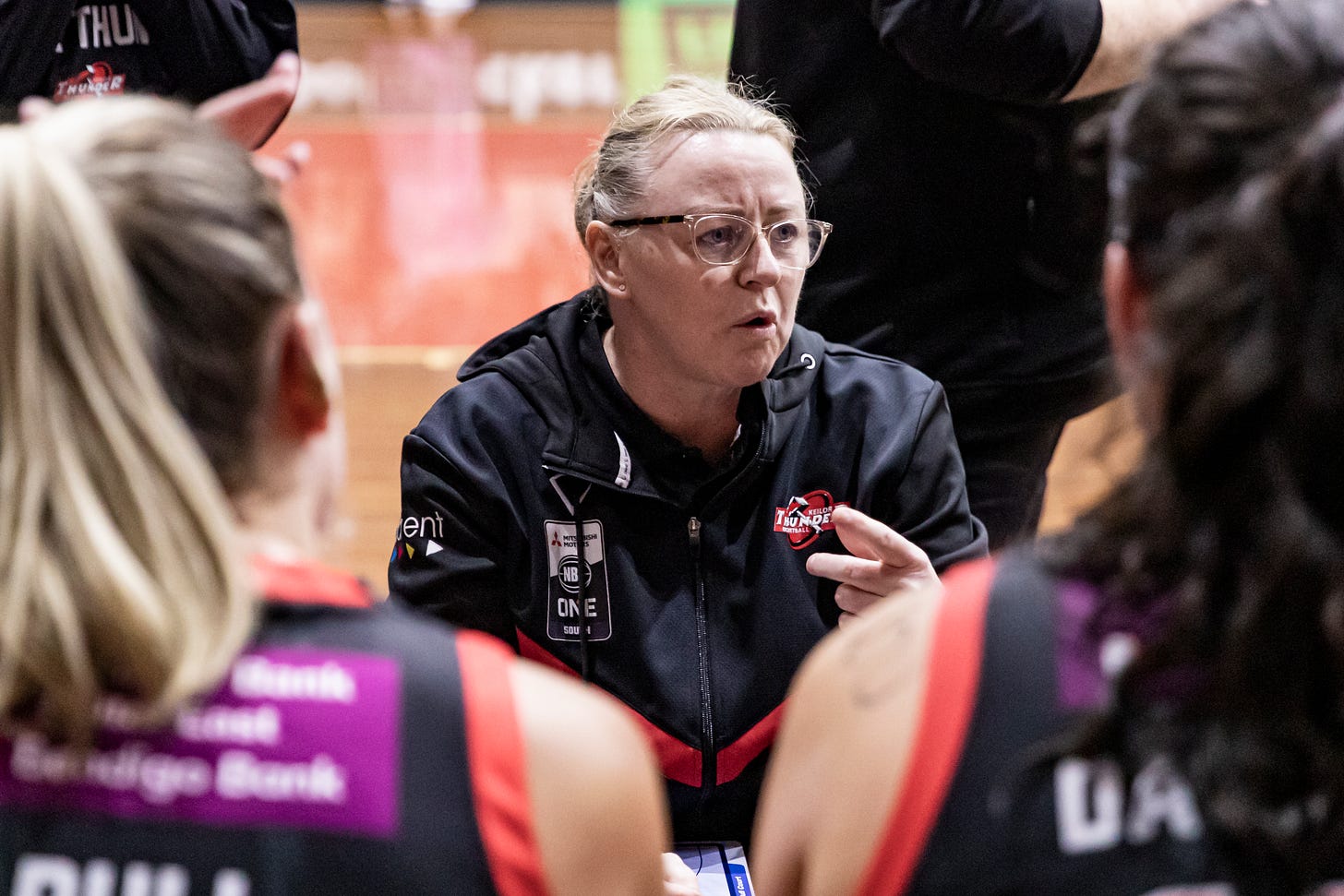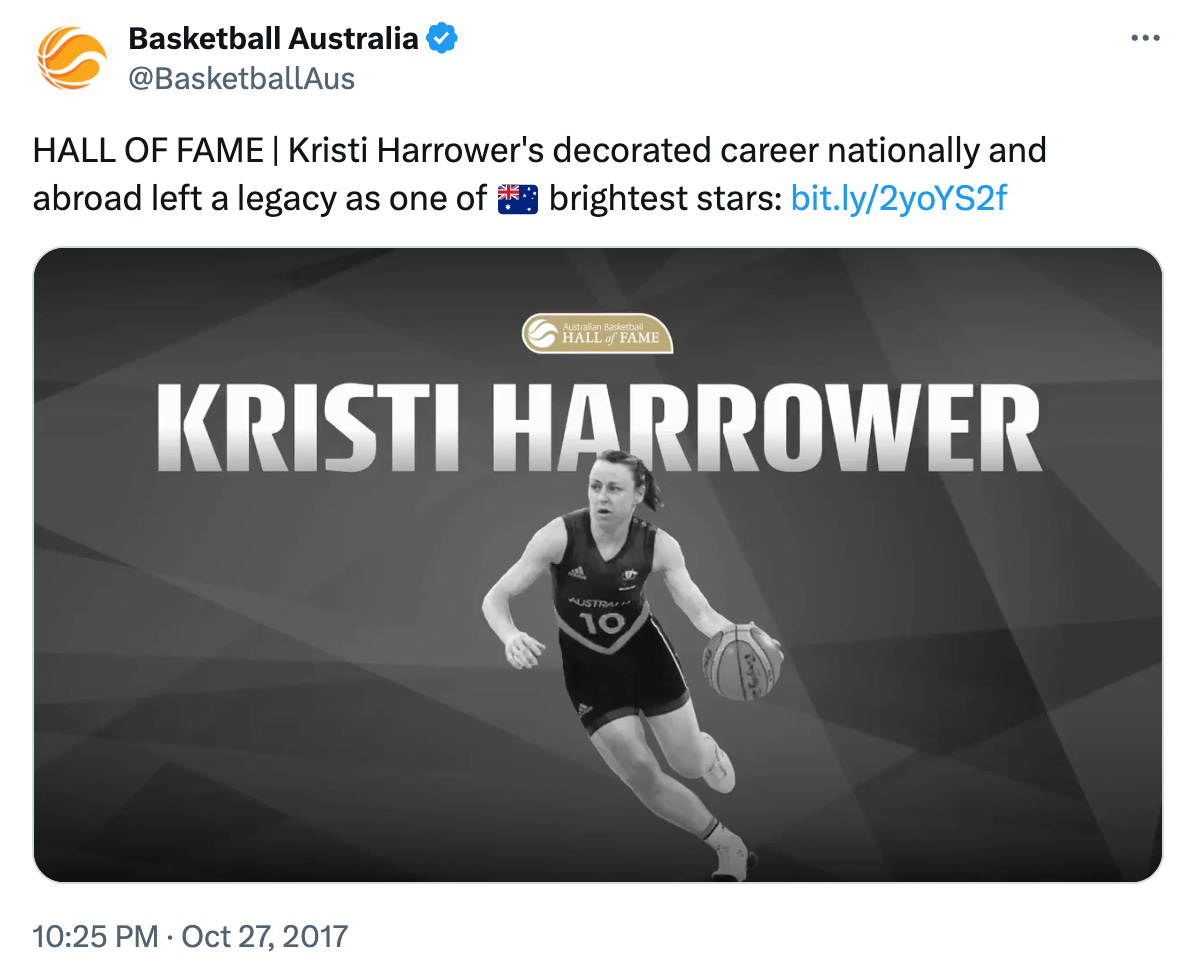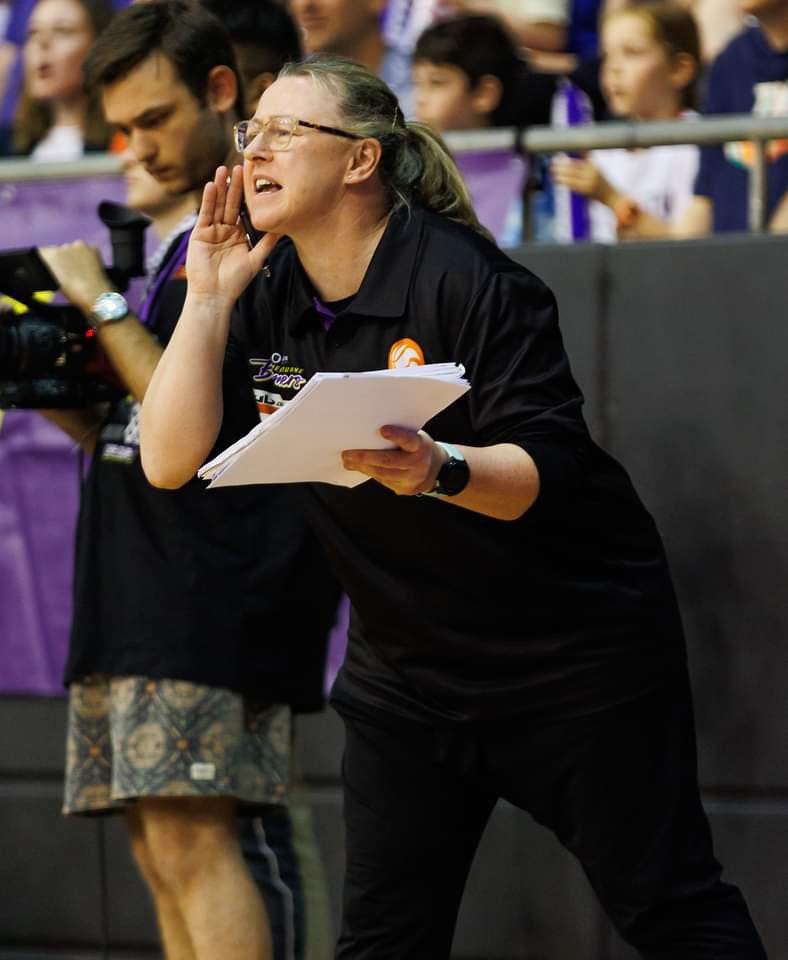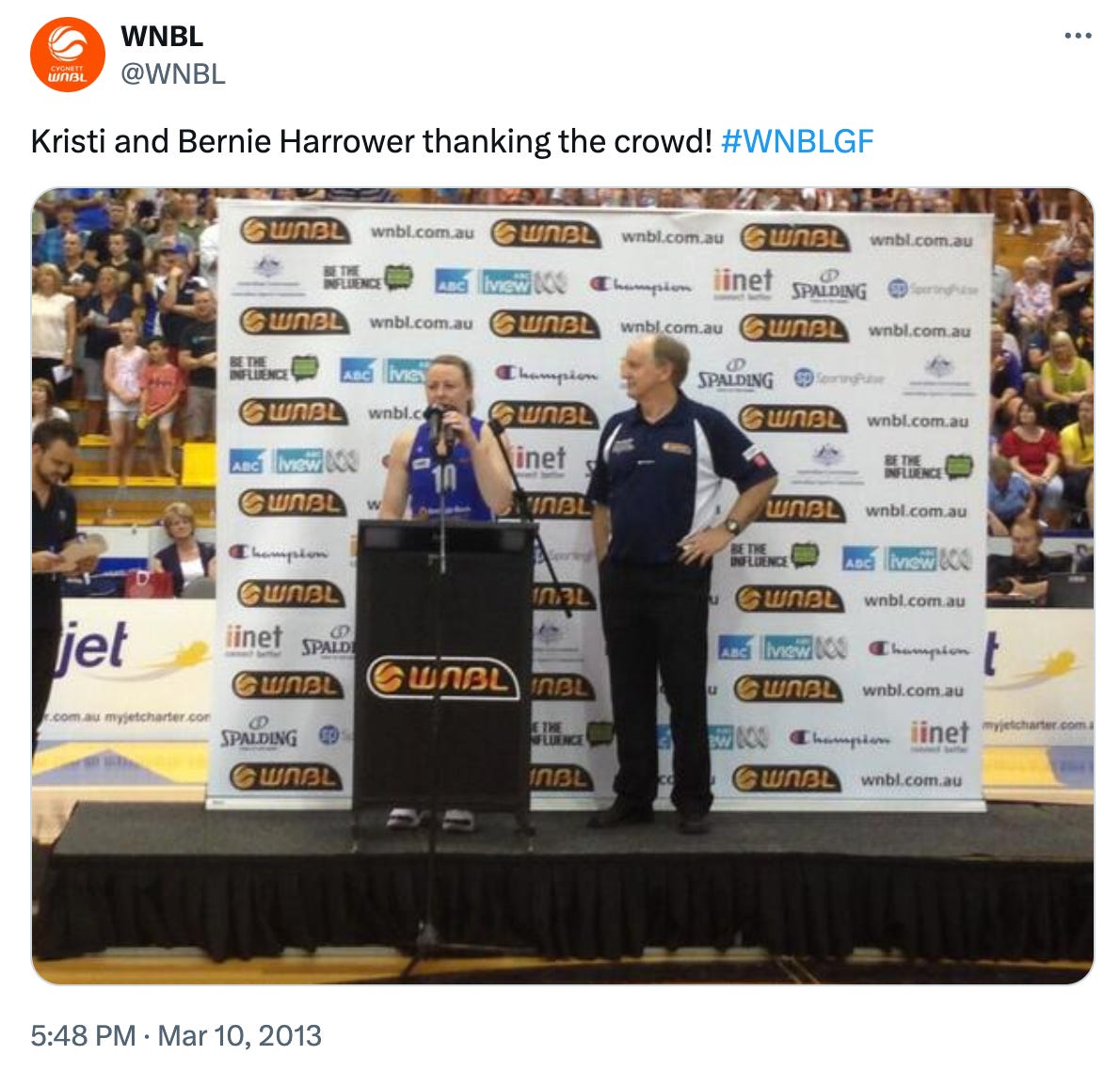On head coaching and giving back: Kristi Harrower is ready for the WNBL
Inspired by her love of the game and passion for teaching, Harrower is ready to take on the challenge as a potential WNBL head coach, and continue giving back to the sport that has given her so much.
Photo Credit: Trent Moore
There are some great stories of successful basketball players who grew up around the game; inspired by their parents who were coaches or administrators, they spent countless hours in basketball stadiums as children and eventually fell in love with the sport.
Think Andrew Gaze literally growing up in a house adjoining the old Albert Park Basketball Stadium in Melbourne as his dad, Lindsay, ran the stadium. There’s Josh Giddey, who got to experience professional basketball at a young age as father Warrick finished his playing career and remained actively involved in many capacities, with mum Kim being a former WNBL player. Let’s not forget Lauren Jackson, with both her parents having been Australian representatives.
And of course, we have Kristi Harrower. The legendary point guard who won multiple titles and medals across the globe, playing on the biggest world stages from the Olympics to World Championships, WNBA to France —and dominated the WNBL— got her start hanging around the old stadium in Bendigo.
Harrower’s mum, Janice, actually owned and ran the canteen at the stadium, while her dad, Bernie, was coaching. Kristi and her sister used watch their father coach, but had a mattress at the back of the canteen for when it was past their bedtime. They’d sleep there until her parents had finished and it was time to go home.
“That’s pretty much how I got started in basketball, and everyone said I had a ball in my hand when I was three,” Harrower told The Pick and Roll recently.
“Dad told me a story not long ago that I used to get my roller skates out and roll around on the court and shoot hoops in my roller skates… It was something I loved doing straight away and I suppose being around it with family, that’s how most people get into it in the end.”
Harrower’s journey as one of Australia’s best guards ever, is well-known. She was one of the best players in the WNBL of her era, but also one of the first Australians to stick in the WNBA back in the late 1990s and early 2000s, playing for seven seasons between Phoenix, Minnesota and Los Angeles.
Today, we probably take for granted that if you’re talented and playing in Australia, you’ll get noticed, but that wasn’t the case twenty-six years ago. It took some luck and good timing for Harrower, who never got drafted, to get that first opportunity with Phoenix.
“I was lucky that Michele Timms was at Phoenix [Mercury] and I was part of the Opals program with her,” explained Harrower.
“I think we went to Colorado to their Olympic training facility and Cheryl Miller was the coach at the time at Phoenix, and Timmsy had already had a season in Phoenix. So, Cheryl came and watched me play and from then, with Timmsy’s push, I end up getting a contract with Phoenix for the next two years.
“Back in my day, unless you were involved with the Opals, you probably didn’t get a look-in, where now it’s completely different because there’s so much streaming of games, so much social media, that they can see stuff that way. Whereas back in our days, it was so much harder to be able to watch a game.”
Of course, the exact opposite is true today. In last month’s WNBA draft, three Australians were selected; two directly from the WNBL. And while those two, Nyadiew Puoch and Izzy Borlase, will wait another year to pursue their WNBA dreams, there are a number of Aussies on WNBA rosters once again this season and Harrower loves how the pipeline continues year after year.
“I think it’s great,” said Harrower.
“I’m sure we’re probably and I think it’s been like this for a long time now, that behind the Americans, we’re probably the next country that has the most players in it. So, I think that really shows how good Australian basketball is.
“A lot of that has got to do with the Opals being so successful for so long. I think Australia has such a great reputation and now, because our league plays in summer, there’s so many players that come out here. So then there’s a lot of coaches and GMs that are watching our league here in Australia and noticing the talent that we have.”
Harrower of course, had a big hand in establishing that reputation, being part of one of the most successful eras in Opals history. She represented Australia at four World Championships / World Cups and four Olympic Games, remarkably medalling at all but one of those tournaments.
Harrower medalled at four straight Olympics, and was part of that historic Opals team that took the gold medal at the 2006 World Championships.
That is a standard that not many Australian team sports can boast, and one that paved the way for countless basketball players to have opportunities abroad that might not have been possible without that prolonged success. It is a legacy that Harrower is extremely proud of, knowing everything that she, and her teammates, put into achieving those results.
“Wearing the green and gold, it always puts a smile on my face,” admitted Harrower.
“The sacrifices that I went through, that’s what I’m trying to pass on. I know things are completely different today, but I was the type of person who sacrificed a lot of things to get to where I wanted to get to.
“Playing for the green and gold was always the ultimate dream for me, and once I was there and I was established in the team, I always made sure I was available because I never wanted to give anybody a sniff to take my position.”
While some of Harrower’s fondest memories of being an Olympian were as simple as just getting her team gear, it’s more about the people she shared those experiences with.
“To go through with the people that I went through [with], I always think I’m pretty lucky, cos [we had just a] great group of people,” she explained.
“The best chemistry I think we had was 2006. There were six of us that were already established and six rookies, and we won gold. I just remember how enjoyable it was. There was nobody in our group that ever thought they were bigger than the team. They knew that the name on the front was the most important, which was the Australian name and we always had belief that we were going to get it done to get a medal.
“I think every Olympics I went to was special in different ways. Sydney was definitely special because it was my first, your home country, we won silver. And then, I’d go to my last one, because it was my last, but I think I played my best game for the Opals ever in my last game and we end up winning bronze. So, there’s so many great memories, great friendships, definitely, definitely a golden era for Opals basketball.”
Returning to basketball
Harrower retired from playing basketball in 2015. After several years away from the sport, she returned as an assistant coach under Chris Lucas with the Melbourne Boomers two years ago. Harrower was also an assistant for the Opals at the 2023 FIBA Asia Cup, working under Shannon Seebohm and alongside Cheryl Chambers and Renae Garlepp. This year, she’s taken the head coaching reins with the Keilor Thunder in the NBL1, where her team currently has a 7-2 win-loss record and is tied for third in the South Conference.
In many ways, coaching was a natural next step for Harrower; it came from the way she played, the type of on-court leader she was, the pedigree from father Bernie, and also her affinity for teaching. There’s an old cliché that point guards make great coaches, but it’s actually great basketball minds and great communicators that do, and Harrower tends to agree.
Photo Credit: Melbourne Boomers
“One thing I will say, I think there’s more pressure on those types of players to go to coach,” she explained. “And I don’t know if that’s just me putting pressure on myself, because everyone said that I had an amazing IQ for the game, played at the highest level, so now I put the pressure on myself to go: ‘alright, this is how I want my team to play and understand the game the way I understood it.’
“Don’t get me wrong, it’s a million times harder than being on the floor, being a coach on the sideline. When I was on the floor, I was involved in what was happening. When you’re a coach, you don’t have that control. You don’t have the ability to control what’s happening out there and you only get so many time outs to be able to do that. So, it is a lot harder.
“But I always felt like I was a great leader and I wanted to be coached hard. I wanted coaches to be firm with me, but I wanted to be taught at the same time. And that’s what I’m trying to do with my Keilor group.”
The opportunity to coach with the Boomers first came up when Harrower sold her businesses in Bendigo and once she was back involved, she absolutely loved it. As the point guard and leader of most teams she played on, she always saw herself as a coach on the floor, was involved in the team scouts and felt like it was something she would head into at some stage.
And now that she’s spent some time under, and alongside, some great and successful coaches, like Lucas, Seebohm and Chambers, adding to what she learned as a player from the likes of Tom Maher and her father Bernie, she’s already shaping the type of head coach she aspires to be.
“Even when I was a player, some of the coaches that I enjoyed playing under and drills we ran, is what I’m trying to implement as a coach,” Harrower said.
“Like, I thought Tom Maher was a great teacher. He taught me how to think like a point guard. With Cheryl, I think she’s a player’s coach where she’ll make changes on the fly. And my dad was exactly the same. He would make changes to take away the strengths from what other teams were doing, or the strength of an individual.
“I learnt so much from my dad as well, because he was real firm. And the biggest thing he was firm on was work ethic. He hated when people were lazy or cruised. He always wanted work ethic and I think that’s what drove me when I was player. But I’m the same as him. I want to make changes on the fly. I don’t want to go ‘alright, we had plan A, but now we don’t have plan B or C.’
“But also for me, the biggest thing is I like teaching. I love the teaching side of things. I think it’s always good to be with other coaches, cos you’re always going to like some things they do and then maybe not like other things, and then you find your philosophy within that.”
With Keilor, Harrower is working with both emerging and established talent. She has the typical development players coming up through the Keilor ranks that you get in most NBL1 programs, as well as some WNBL level DPs in Lilly Rotunno and Lily Carmody. She has some young, but more established talent in the likes of Issie Bourne who just had one of the most dominant rookie seasons in WNBL history, and Tera Reed who also had a great debut season in the WNBL. But she also has established, veteran talent in Maddi Rocci and Penina Davidson.
It's a great combination for a new head coach, and it gives her the opportunity to really test and refine her coaching skills and philosophies.
“I’m lucky. I’ve got a great group at Keilor,” she said.
“I was lucky that from being involved with the Boomers, a lot of those girls wanted to come and play for me. So we already had that connection. And then, with Maddy Rocci, she wanted me to be her mentor when we were with the Opals at Asia Cup last year. And then a lot of people said to me, ‘How did you get Issie Bourne?’, and I said ‘I don’t know, one phone call and I had her.’ And, lucky that her boyfriend’s here as well playing with the men’s team.
“But great individuals. Not even just on the floor, off the floor. And that was the biggest thing for me, recruiting people that are great people as well as players, because it makes your job so much easier. So, I have a really good team, but a team that is buying into the system and a team that wants to work hard and they all want to get better.
“For me, it’s just giving back my experiences and teaching. Even when they’re at the WNBL level, they still want to learn. So, it’s about teaching them. It might be teaching footwork or it might be teaching what you should have done in this situation, or if she takes this away from you, now do this. Working on specific things, like with guards, to make a movement with the ball before you go. Don’t just catch and go.
“But my philosophies are huge on defence. Defence is so important for me, and as most coaches say and I believe it because I’ve been in situations like this, defence will win you a championship. Because, you can have a crappy offensive game, but if you can keep teams to a low score, you’re still in the ball game. And if your defence is crap and you’re not having a good shooting game, you’re not even in the game. So, that’s really important for me.
“And I don’t think you need a pick and roll in every offence. I’m trying to bring back into my team some of the old school stuff, where you run an offence and you’re running it because you know who you want to get a shot for. And taking away the strengths of other teams, that’s really important to me as well.”
Towards the WNBL
Harrower now wants to be a head coach at the WNBL level. And while she hasn’t been formally coaching for very long, based on everything she’s achieved over her career and what she’s done in coaching these last few years, she doesn’t just believe she’s ready – she knows it.
“I want to coach players the way that I would want to be coached. I think that’s really important,” she explained.
“There will be times when people will not agree with you, or when people are not going to be happy with their court time, but if you can get them to see the bigger picture and understand that it’s not about the individual, it’s about the team, that’s really, really important.
“And I think it’s about holding people accountable. My dad did that. He kept me accountable all the time.
“I feel like I’ve been a coach my whole life on the floor, and now being with the Opals and being with Chris, I feel like I’d be ready to take on a head coaching job. It’s just the love that I have for the game and the teaching side of things to make players better.”
Harrower’s love for the game was established from those days camping out on mattresses in the stadium canteen and roller skating around the old Bendigo stadium, but it’s never wavered or dissipated.
And that same love and the desire to pass it on to the next generation is what coaching is all about; it’s why Harrower is already a great coach. And now, she’s ready to take it to the next level, and to keep sharing that passion we’ve seen and known all along.





